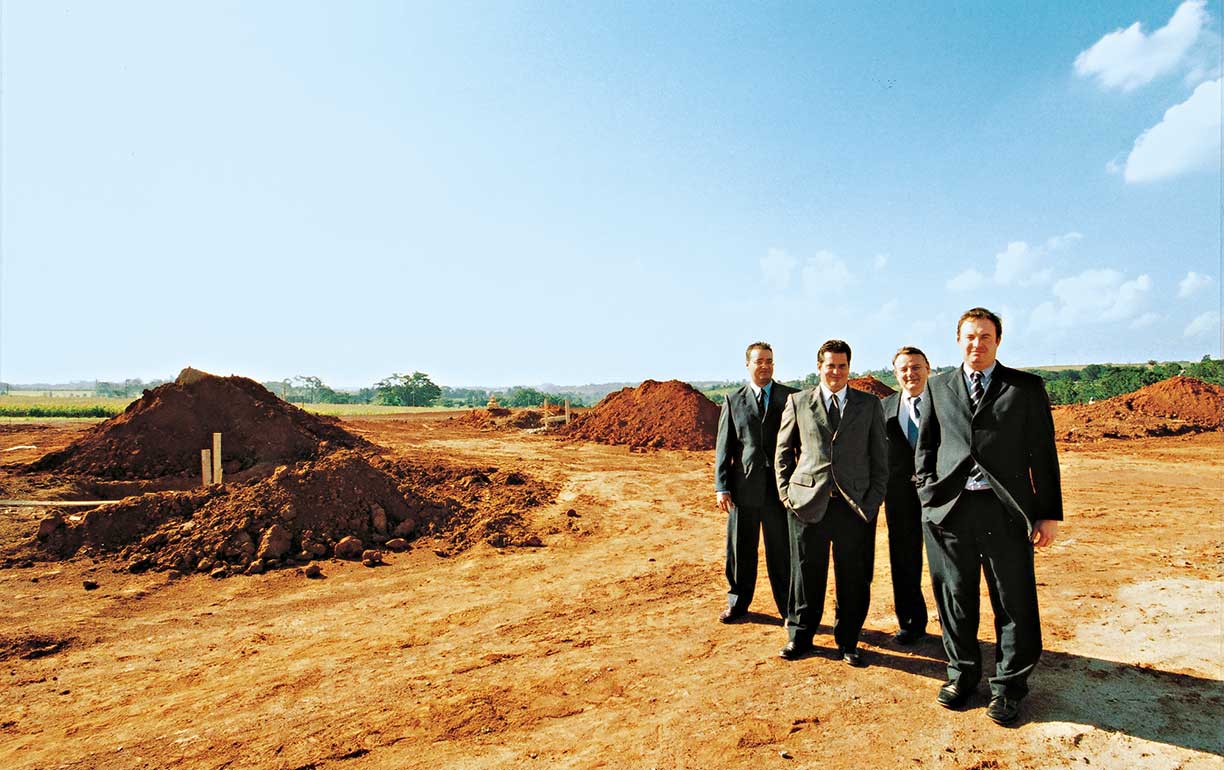
Continent of opportunities.
Up to today, South American exporters have concentrated on marketing domestic natural resources and agricultural commodities. In order to improve the utilization of global opportunities, airfreight is playing an increasingly important role, as a planet report from Brazil, Chile and Venezuela shows.
Anyone seeking a northbound escape from São Paulo’s traffic chaos will encounter a motorway sign that reads: “Aqui passa o Trópico de Capricórnio”. The Tropic of Capricorn, also called the “Southern Tropic”, separates the tropics from the temperate zone. However, in contrast to the stony jungle of the metropolis of 20 million people, with its countless high-rise buildings and congested roads, there is nothing jungle-like about the landscape here. The tidy borders to the left and to the right of the well-developed road surface look like something that might be seen in Central Europe.
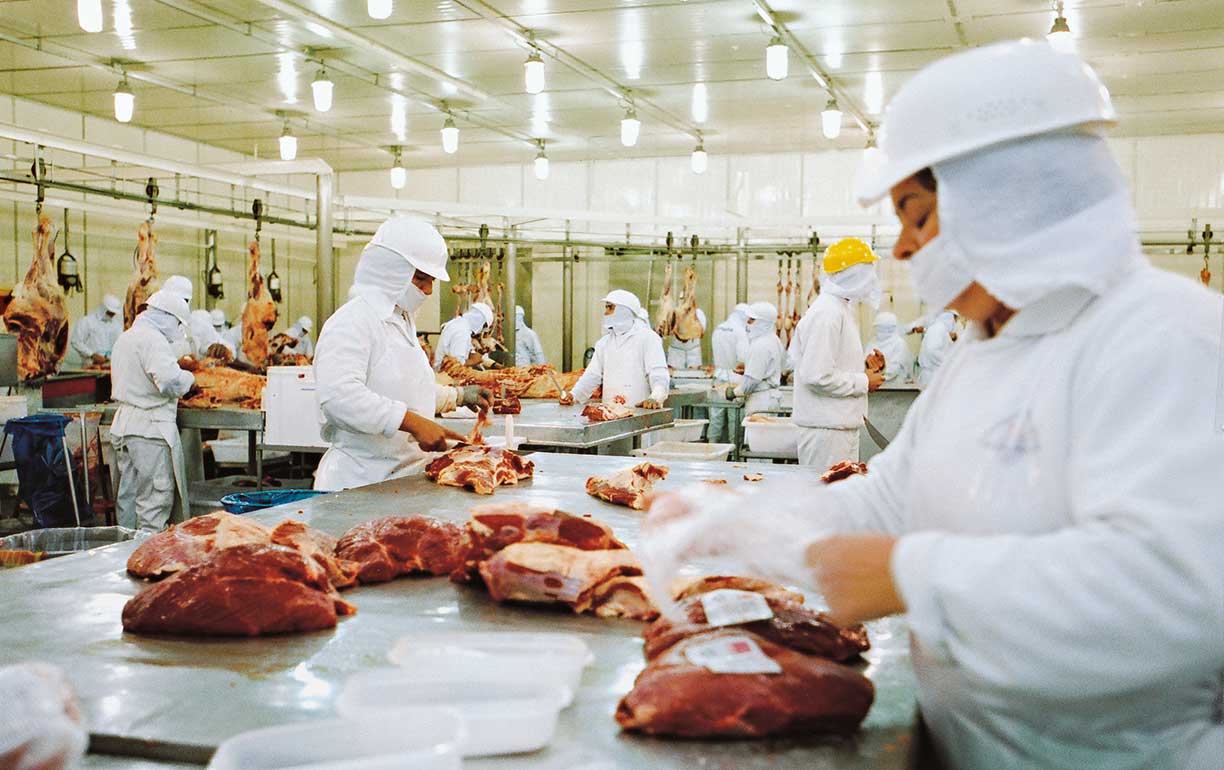
Not far from the motorway lies the sleepy little town of Cajamar. One of five factories run by the company Independência, Brazil’s third biggest beef exporter, is located on the town’s industrial estate, hidden behind high white walls. While arctic temperatures of up to minus 25 degrees centigrade prevail in the cold storage rooms inside, the thermometer beneath the arcades in the yard outside shows 30 degrees centigrade.
Men in white rubber boots relax while playing cards in the shade. They have taken off their thick overalls and tied them around the waist. These men are forklift truck operators, who will soon muffle up again to maneuver freshly packed meat into the cold rooms inside the building. About 180 million people live in Brazil – and there are almost just as many cattle. The country has advanced during recent years to become the world’s number one beef exporter. Far away from the metropolises of millions, the livestock is raised in herds that average over one thousand animals. In contrast to the European mass livestock breeding, Brazilian cattle graze freely out in the open and are at most guarded by a few gouchos who are riding on horseback.
“The special thing about Brazilian beef is its quality. It is created by the animals’ natural fodder and because the meat is not marbled by fat in the case of our breed,” Roberto Fiori, Managing Director of Independência in Cajamar, explains. About 70 percent of the Brazilian stock consists of Nelore cattle, a robust species once introduced from India.
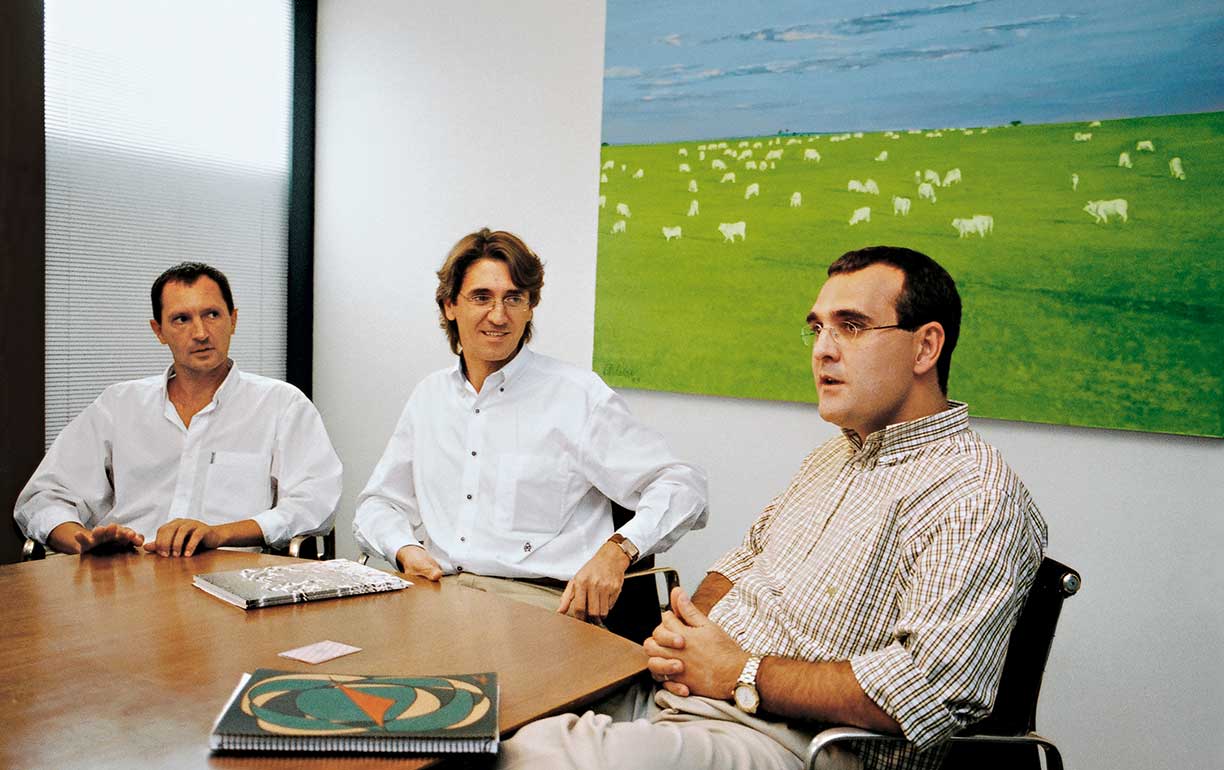
At Independência alone, 2,200 head of cattle are processed per day. Production only stops on Sundays. Meat processing is teamwork: “What we make here is made by order,” Sergio Teizen, Export Manager at Independência.
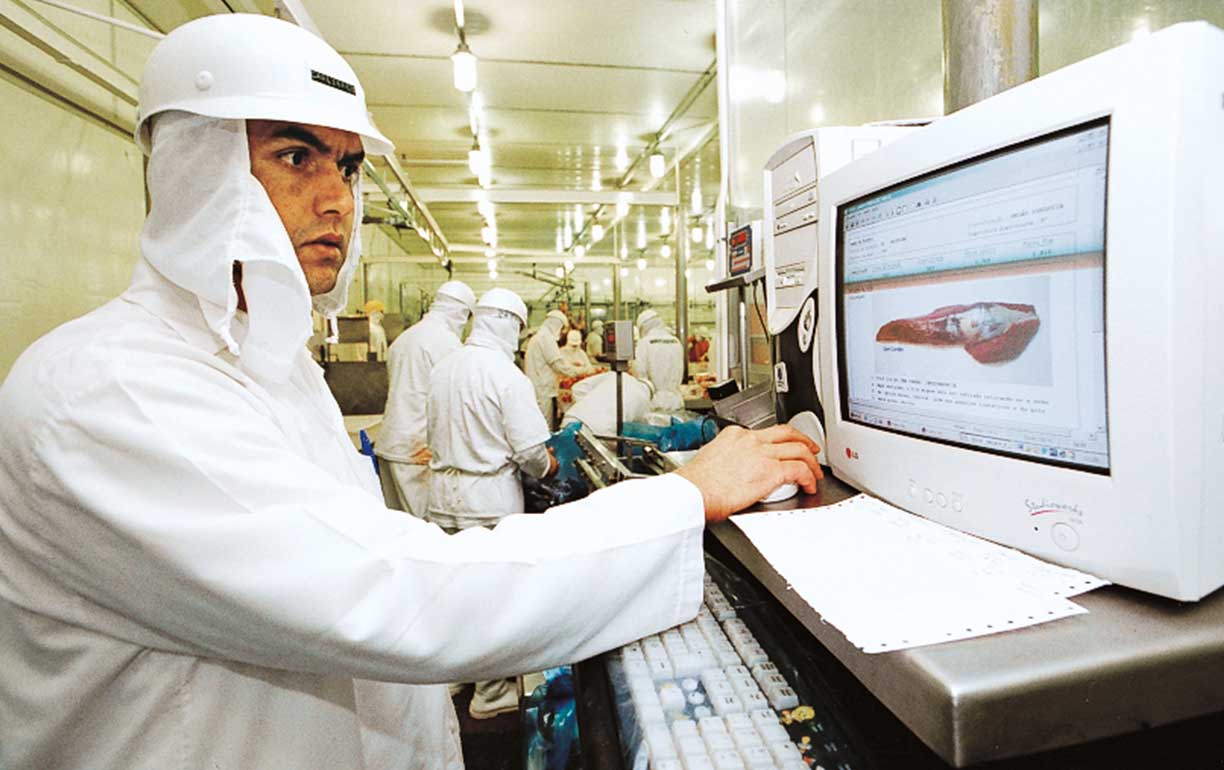
“Whether it is filet mignon to be delivered to France, carpaccio to Italy or tafelspitz to Germany – the production managers in the hall in Cajamar can see on the computer what is needed next and brief their team accordingly.”
Depending on the customers’ requirements, the goods are packed at the end of the process in boxes, which already display the brands of the respective importers: Bervini, Brookefield or Le Beef. Independência attaches great importance to hygiene. The processing hall is cooled down to seven degrees. The employees are moving continuously through the corridors with small trolleys and disinfect the knives and steels of the butchers.
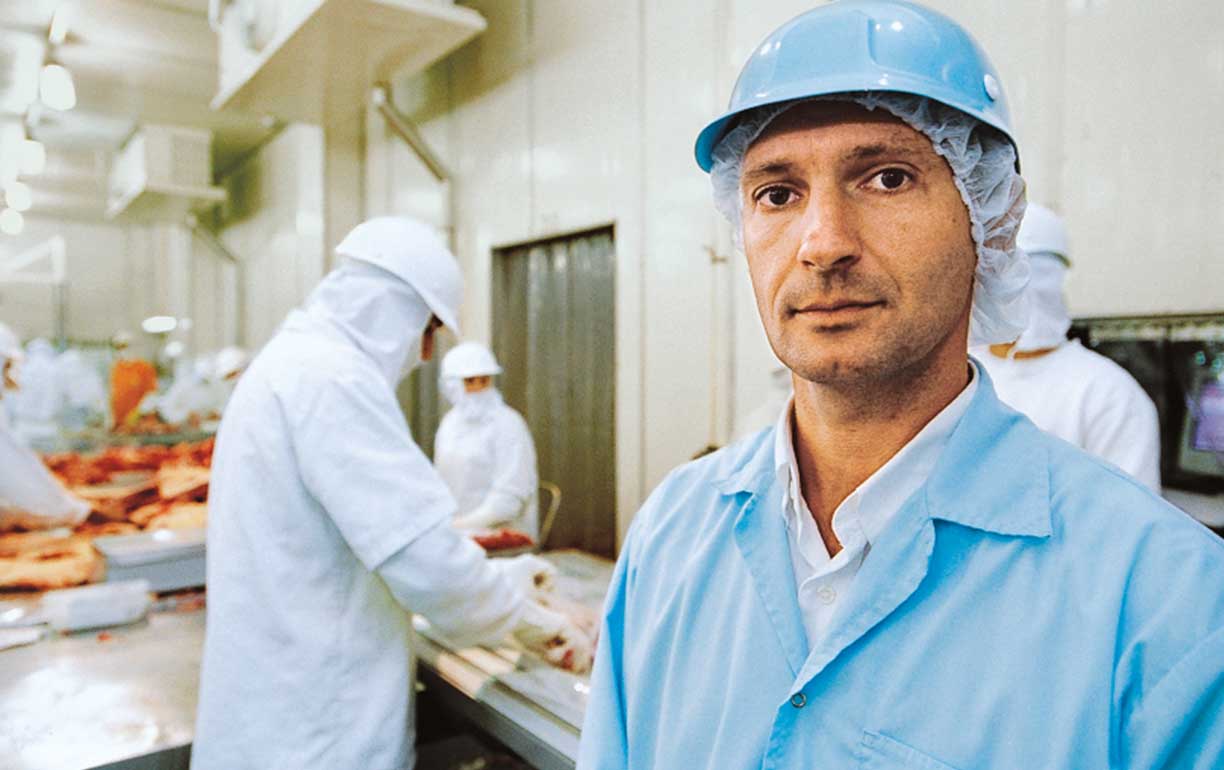
In all parts of the production and warehousing area, specially disinfected protective clothing has to be worn. Hair is covered by nets, masks worn over the mouth are compulsory. And anyone who wants to re-enter the building after a break must meticulously scrub and disinfect his or her rubber boots.
While for the most part the commodities await delivery in a deep-frozen condition, the fine fresh meat is only put into short intermediate storage at minus 2 to 0 degrees. “Depending on the season and demand, five to eight percent of our production reaches its destination by airfreight.” Fiori, whose company is currently being certified in accordance with the ISO 14001 standard, reports. Refrigerated trucks transport the produce directly to the São Paulo Viracopos Cargo Airport, where a freighter from Lufthansa Cargo lands several times a week.
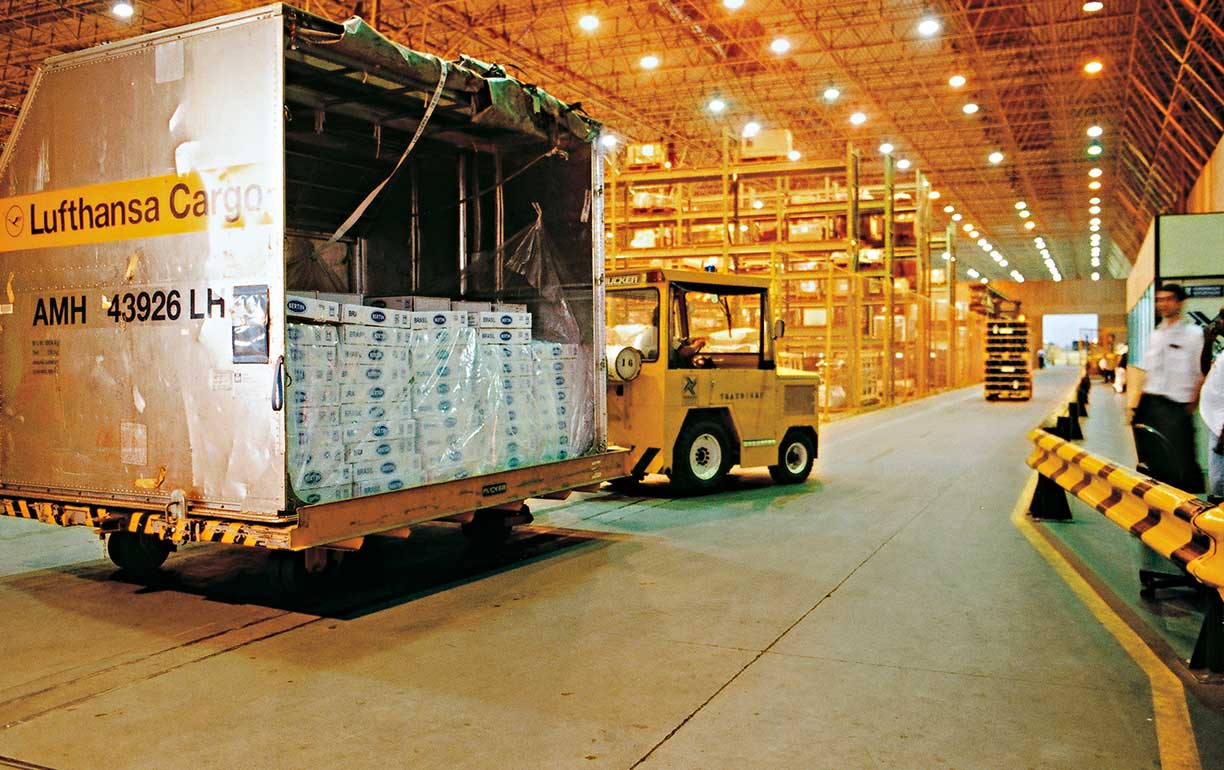
“It is very important for us to know who is transporting our goods,” Fiori emphasizes. “We only work together with top logistics specialists, since we must be certain that our shipments do not stand around in an unrefrigerated condition on an apron area somewhere during the journey.” One of these companies is São Paulo-based Logimasters. The service provider ensures that Independência’s expectations are fulfilled throughout the entire supply process. “The shipments today are subject to a permanent monitoring of temperature,” explains Managing Partner Marco Aurélio Soares, who founded Logimasters four years ago and who, in the meantime, has turned it into the biggest Brazilian airfreight forwarder in the meat segment.
“If the temperature is only two degrees too high at some stage during transportation, that means a major commercial loss for our customers, since the end buyer then no longer pays the agreed price. With Lufthansa Cargo’s Fresh/td and Fresh/td To-Door, we are on the safe side.”
Today, Logimasters forwards approximately 10,000 tons of beef per year – tendency rising. Apart from the special quality, it is its price that makes beef from Brazil so successful on the international market: while the production of one kilo of beef in the USA, for example, costs 1.80 dollars and in the EU member state Ireland 2.30 dollars, the Brazilians manage a figure of 90 cents. In order to be able to serve his customers even better in future in this booming export market, Logimasters is currently building its own refrigeration hall near Viracopos Airport. The building will also house the administration of the growing company. “And we shall also build a soccer pitch for the company team and the young people in the area,” soccer fan Marco Aurelio explains.
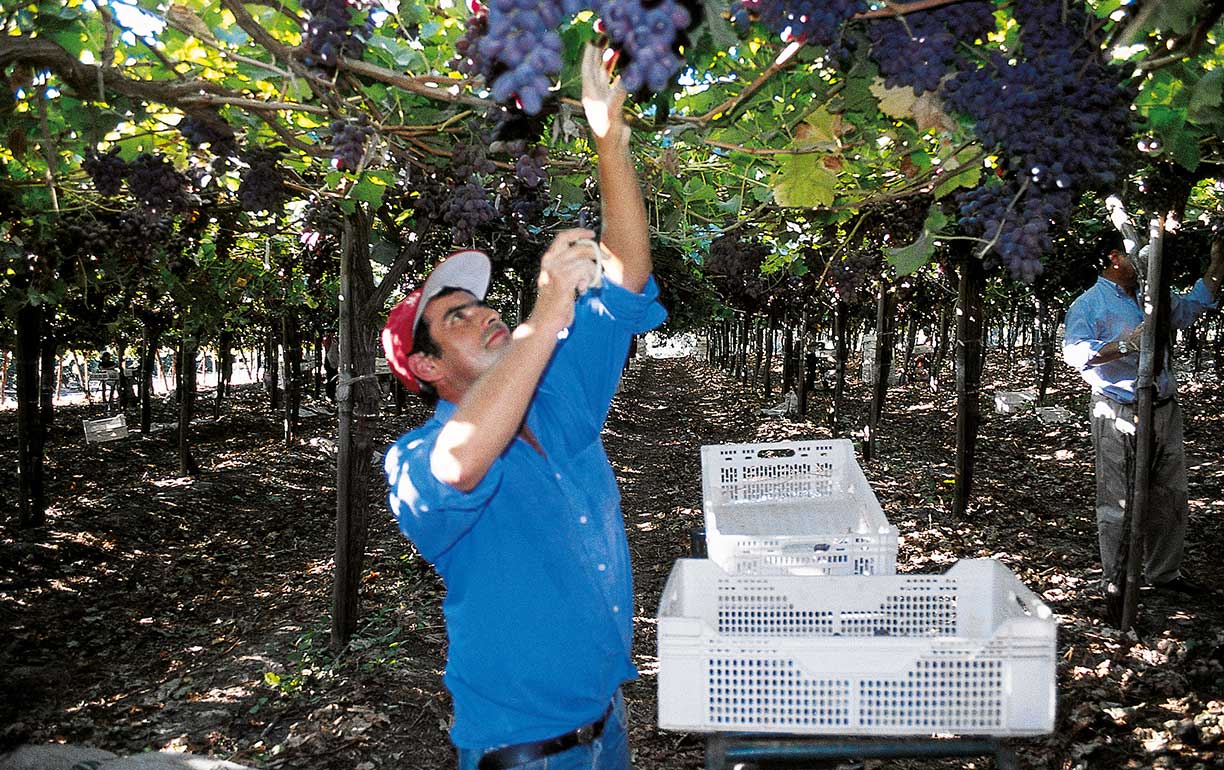
Change of scene: Only scattered rays of sunlight penetrate the thick foliage that covers the area of several dozen soccer pitches. A cool breeze blows despite the 28 degrees centigrade displayed on the thermometer.
Harvesting helpers carefully cut single grapes here and there out of green-and-violet bunches dangling down en masse from the shady roof of leaves. This gives other grapes room to grow.
The seedless grapes from Chile are sweet, juicy and firm. This particular variety of grape is not, for example, pressed into wine, but ends up as a delicacy on the tables of consumers in America, Europe and the Far East.
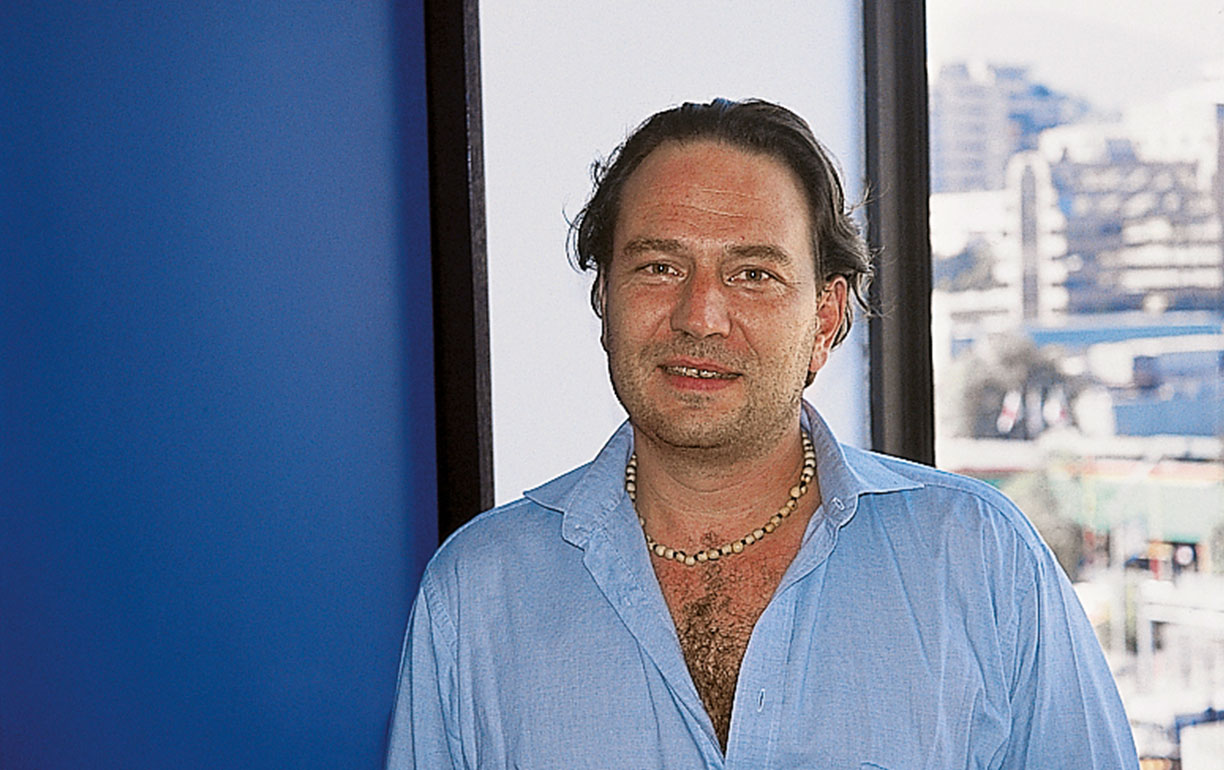
“Care during all processes is our recipe for success,” says Gabriel Perez, founder and president of Gesex, an association of nine Chilean fruit growers. “This begins with the growing of the plants and continues throughout the cultivation and harvesting of the grapes and up to their intermediate storage and delivery.”
In addition to grapes, Gesex also sells stone fruit, such as peaches, cherries and plums, and citrus fruit, pears, kiwis and avocados. “Chile is exactly the right place for growing fruit,” says Perez, who cultivates about 70 hectares of land himself. “We have a climate similar to California – better than the South Africans, the Australians and New Zealanders –, we have room, and our cost situation is competitive.”
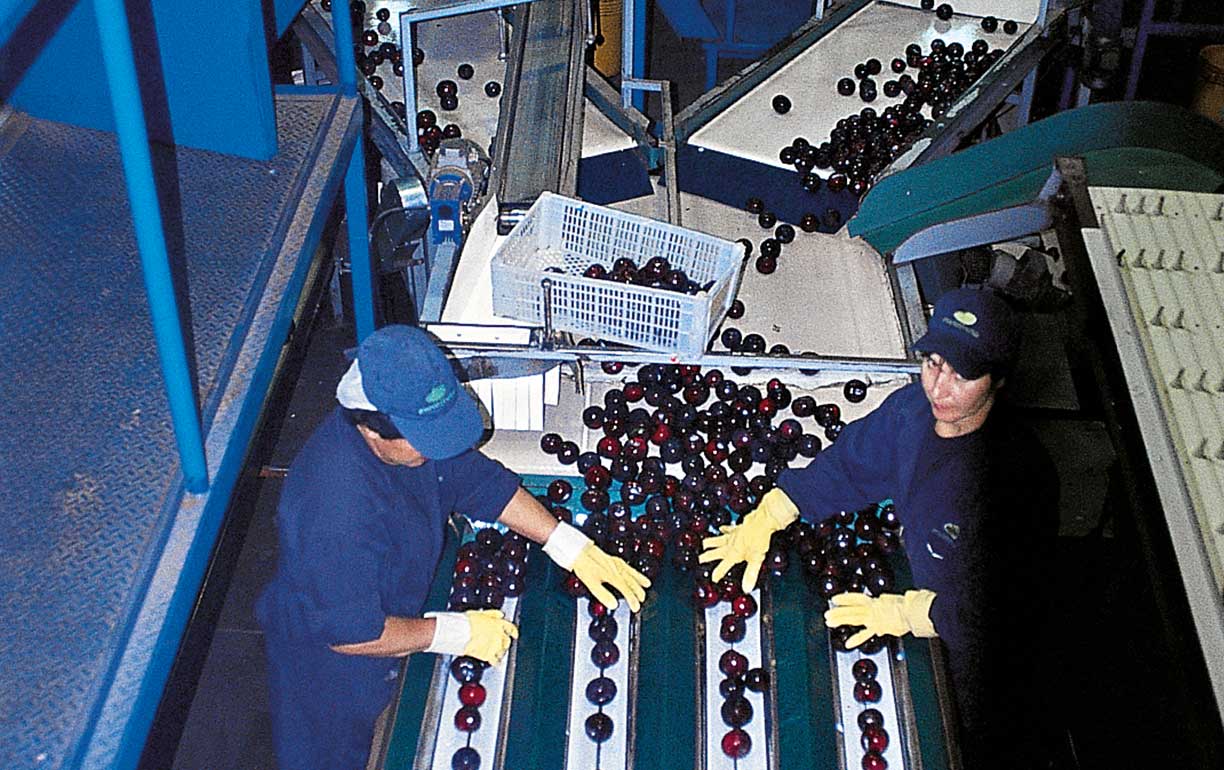
A good six years ago, Perez hit on the idea of taking the marketing of his products into his own hands and of occupying a niche that has quality products alongside the global players Dole, Chiquita and Del Monte, who share almost half of the Chilean market. “We sell our products directly to the big supermarket chains, such as Marks & Spencer, Tesco, Morrison, Aldi and Ahold. Our customers, however, not only receive the fruits, but also a complete service. We portion, label and package the fruits whichever way and whenever our buyers want them and that is exactly how the housewife finds them in the supermarket.”
The “processing” of the Gesex fruits is carried out in an air-conditioned hall, about one hour’s car drive southwest of Santiago de Chile. Size, color and shape are checked again here by hundreds of hard-working hands.
Machines help the packers to sort the fruits according to weight and appearance. About 1.8 million crates of fruit were transported for Gesex last year.
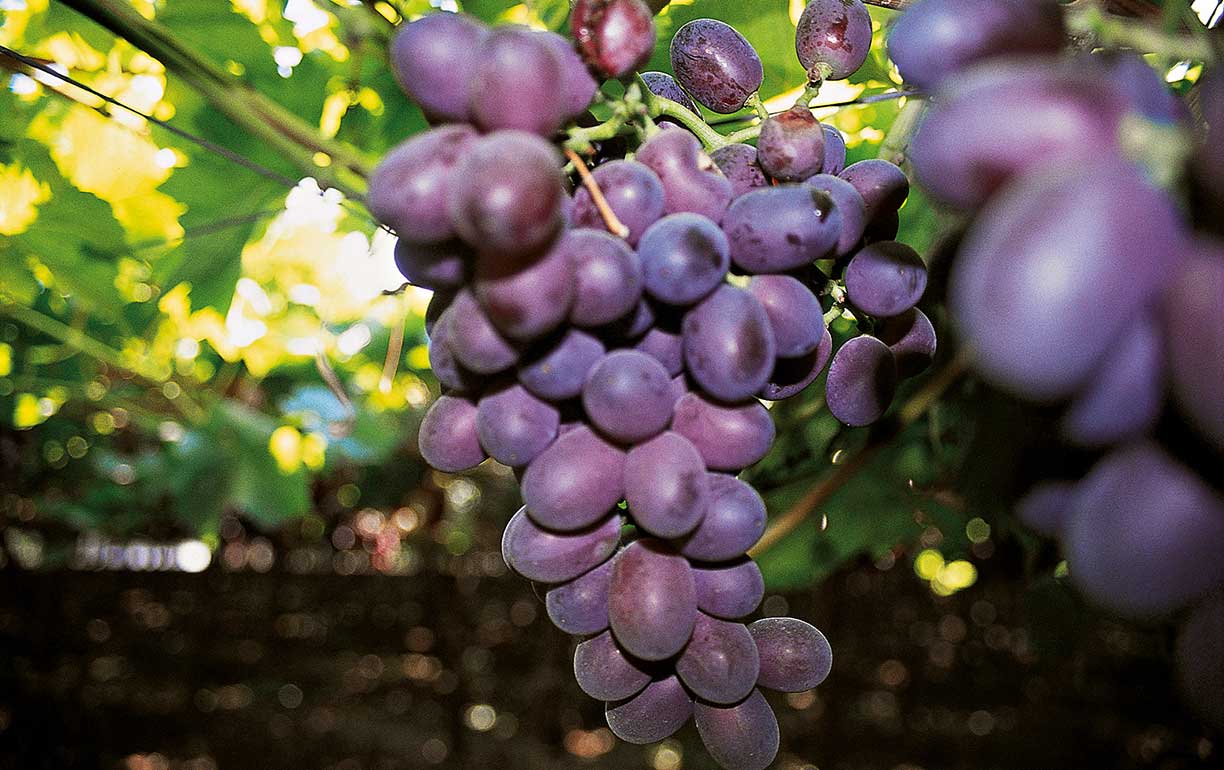
Most of them by ship, but airfreight is becoming increasingly important. “Cherries, for example, are much too perishable to endure a long journey by ship,” Perez explains. “What is more, we often have to satisfy certain demand peaks and that’s when you need fast delivery to get the business.
To ensure the quality of transportation, Gesex turns more and more frequently to Via Mat. Over the past five years, the Swiss logistics company with branch operations worldwide, has developed into one of the most important forwarders for perishables from Chile and took on the airfreight logistics of approximately 400 tons for Gesex alone during the 2003/2004 harvest.
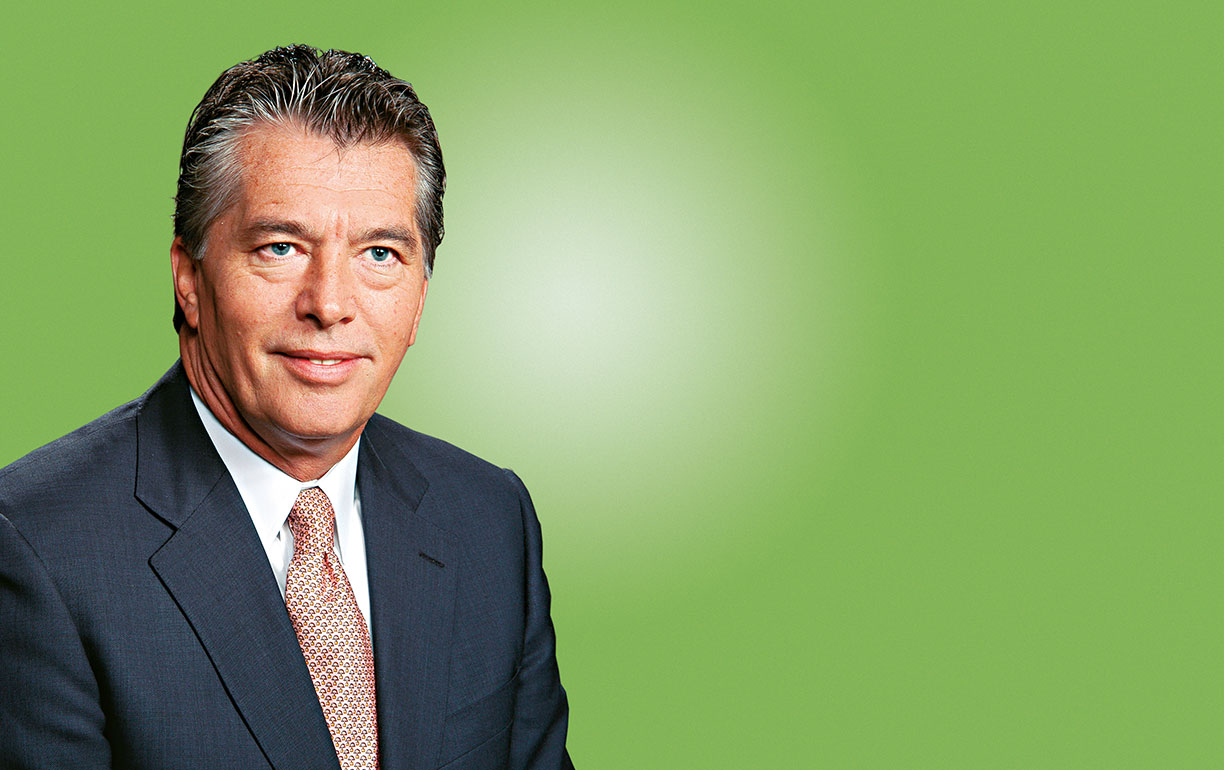
In addition to fruit, Via Mat also exports salmon and fruits of the sea as well as cosmetics and precious metals by airfreight on behalf of Chilean shippers. Martin Böni, General Manager of Via Mat in Santiago, attributes the success of his company on the Chilean market to the fact “that the transshipments really work.” Via Mat forwarded 130 major shipments with Lufthansa Cargo alone last season. Performance: zero complaints.
“The shippers in our market segment insist on knowing who has been entrusted with their shipments,” says Böni. “If Lufthansa Cargo was to offer even more capacity during the harvesting season, we would have no problems at all filling it.”
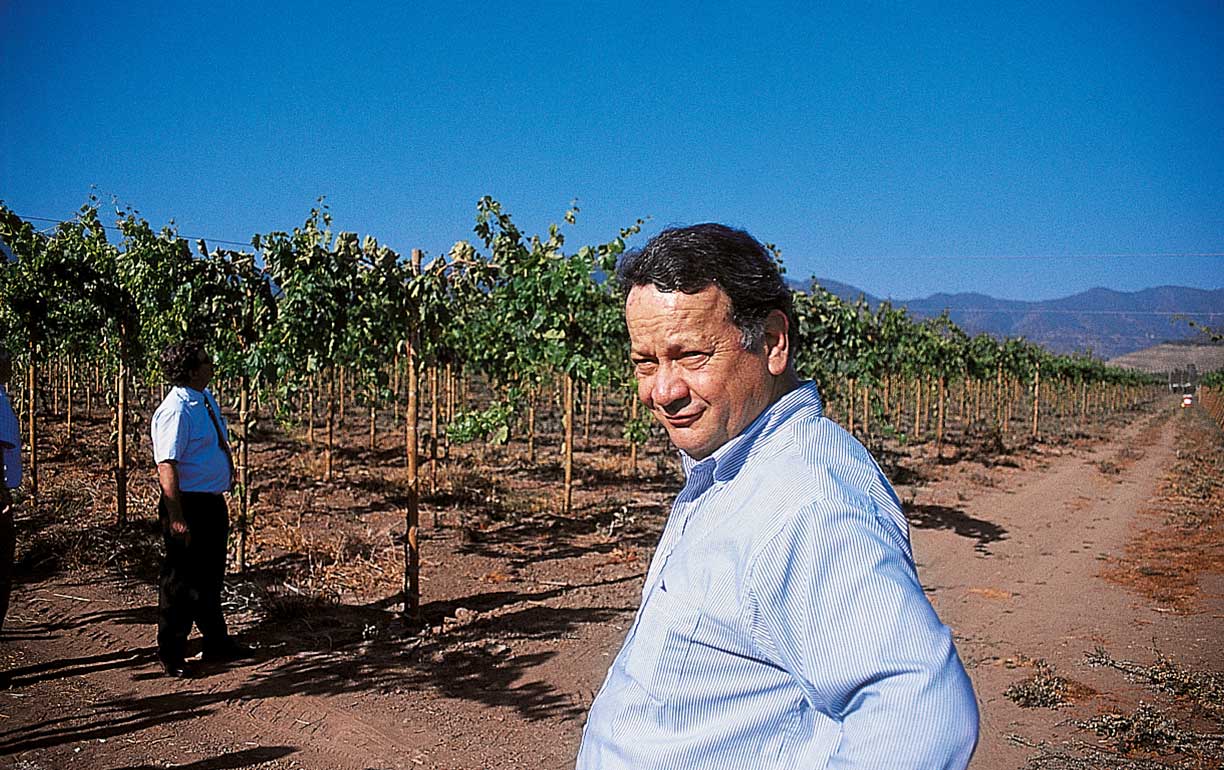
During recent years, Chile has developed into the South American model state. In contrast to neighboring Argentina, the government has paid attention to stable public finance and a freely tradable currency, which has enabled Chilean products to assert their position on global markets. Although copper is still the most important export product in the mining state Chile – the country alone mines 35 percent of all available copper worldwide – the government has additionally been able to draw up free trade agreements with the most important markets. “The agreements with the EU have given our business yet another substantial boost,” says Gabriel Perez.
Fruit from Chile, meat from Brazil – although there are technologically more sophisticated export products among the South American shippers, it takes quite a long search to find them: for example, Embraer, the Brazilian aircraft manufacturer, telecommunication network engineers such as Siemens or the various automotive manufacturers operating in Latin America.
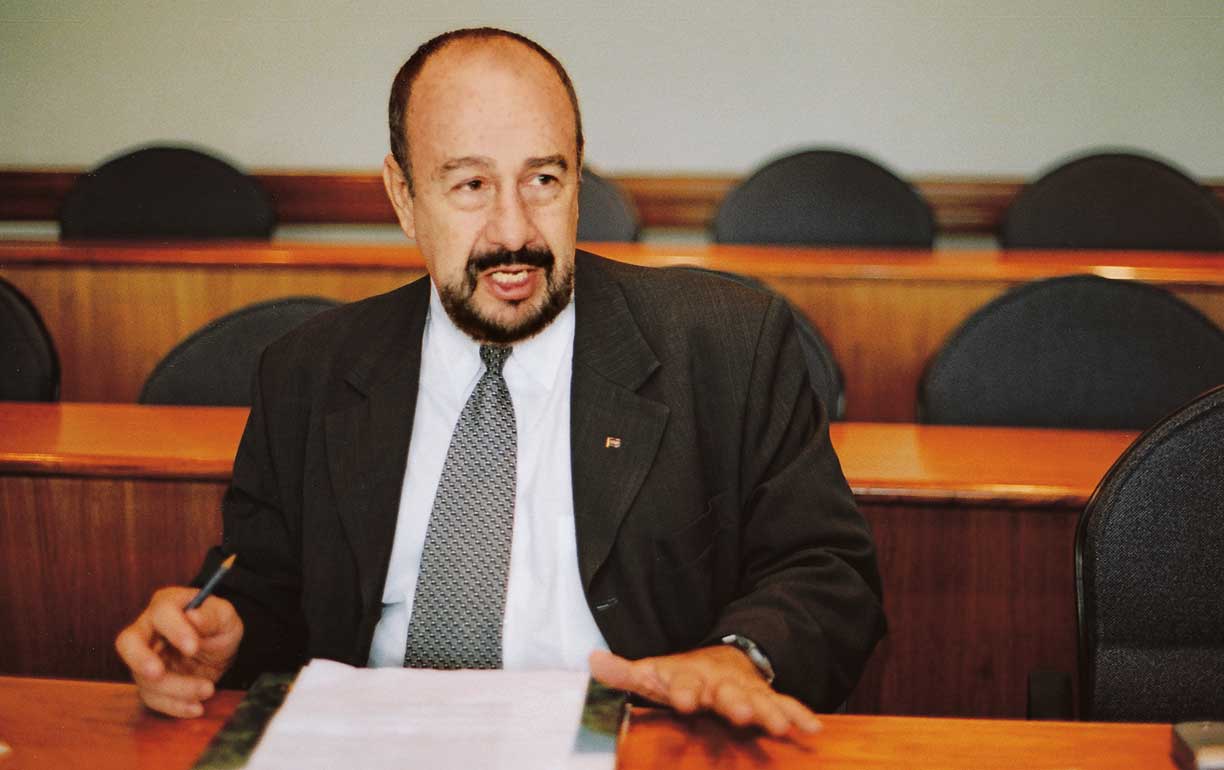
In the opinion of Marcos Cortez Campomar, an economics professor from the University of São Paulo, the reasons for the underdevelopment of most Latin American economies are of an historical nature: “A comparison between the settlement and development of North and South America confirms that the people who settled in the North, wanted to build up a better life for themselves and their families. Latin America, on the other hand, was colonized by people who only had one thing in mind: to discover the country’s treasures and to bring them back to Europe. Things have essentially stayed that way.”
It is impossible to catch up on the lead of the developed countries, says Prof. Campomar. He urges, therefore, that the South American continent should utilize its natural resources more resolutely and market them itself. “Our strength is the richness of the countries, natural resources and enormous potential in the agricultural sector.”
As agricultural products, however, are not generally transported by airfreight, the market in South America remains characterized today by imbalanced traffic flows. The airlines offset this with the help of creative routings. Venezuela is an example: although the only OPEC state in Latin America has a significant oil production and has comparatively numerous imports, there is not a great deal to be “picked up” for airfreight on the export side. That is why, for example, the freighters from Lufthansa Cargo flying back from Caracas are not filled with Venezuelan goods, but fly with flowers from Colombia, which are in great demand in the European market.
Under its president Hugo Chavez, who has taken up the cause of far-reaching social reform, Venezuela has recently moved towards an isolationist course in its foreign policy – a development that the business community is observing with concern, since it could deter foreign investors.
“Political stability will be the decisive criterion for success. This also includes the discontinuation of the exchange rate control,” says Ian McGaffney, Managing Director of Schenker Venezuela and an established expert on the market. Despite the current political development, McGaffney sees great opportunities for his 120-strong team, which is represented by six offices in Venezuela: “Venezuela is a country with numerous resources and a tremendous potential. We expect great investments in the oil, gas and petrochemical industry, which must boost its productivity.”
Conclusion: Political and, above all, fiscal policy stability in conjunction with investments in the modernization of the domestic export economy would appear to be the key criteria for a prosperous development in all South American countries.
The crash of the Argentine economy in 2001 that led to a radical devaluation of the peso, which was pegged up until that time to the dollar, and to a destruction of the savings of the country’s middle class, is still firmly embedded in the awareness of many market participants. This is why forwarders and shippers are building on the development of sustainable business models based on tangible product qualities so as to improve their global marketing opportunities for the future.
www.logimasters.com.br
www.gesex.cl
www.schenker.com
www.viamat.com
www.independencia.com.br
|
It is impossible to catch up on the lead of the developed countries, says Prof. Campomar. He urges, therefore, that the South American continent should utilize its natural resources more resolutely and market them itself. “Our strength is the richness of the countries, natural resources and enormous potential in the agricultural sector.” As agricultural products, however, are not generally transported by airfreight, the market in South America remains characterized today by imbalanced traffic flows. The airlines offset this with the help of creative routings. Venezuela is an example: although the only OPEC state in Latin America has a significant oil production and has comparatively numerous imports, there is not a great deal to be “picked up” for airfreight on the export side. That is why, for example, the freighters from Lufthansa Cargo flying back from Caracas are not filled with Venezuelan goods, but fly with flowers from Colombia, which are in great demand in the European market. Under its president Hugo Chavez, who has taken up the cause of far-reaching social reform, Venezuela has recently moved towards an isolationist course in its foreign policy – a development that the business community is observing with concern, since it could deter foreign investors. |
“Political stability will be the decisive criterion for success. This also includes the discontinuation of the exchange rate control,” says Ian McGaffney, Managing Director of Schenker Venezuela and an established expert on the market. Despite the current political development, McGaffney sees great opportunities for his 120-strong team, which is represented by six offices in Venezuela: “Venezuela is a country with numerous resources and a tremendous potential. We expect great investments in the oil, gas and petrochemical industry, which must boost its productivity.” Conclusion: Political and, above all, fiscal policy stability in conjunction with investments in the modernization of the domestic export economy would appear to be the key criteria for a prosperous development in all South American countries. The crash of the Argentine economy in 2001 that led to a radical devaluation of the peso, which was pegged up until that time to the dollar, and to a destruction of the savings of the country’s middle class, is still firmly embedded in the awareness of many market participants. This is why forwarders and shippers are building on the development of sustainable business models based on tangible product qualities so as to improve their global marketing opportunities for the future. www.logimasters.com.br |
Interview - “Build on our own strengths”
Interview with Prof. Dr. Marcos Cortez Campomar, Director of the Institute for Business Administration at the University of São Paulo, on the business perspectives in South America.
planet: What is the situation of the Brazilian economy today?
Prof. Dr. Marcos Cortez Campomar: Brazil is not in an easy situation. Of the 180 million Brazilians, only about 80 million are firmly integrated into working life. At over 16 percent, the key interest rates are comparatively high, but lowering them is hardly advisable. Although it would create jobs, it would also lead to a renewed heating up of inflation and deter investors. We must, in my own opinion, build on our strengths.
planet: What are they?
Campomar: In almost all Latin American countries, great opportunities exist in the agricultural sector. A good deal of development potential still lies dormant here – in terms of technology as well as distribution. Brazil, for example, has the space and the climate to keep pace internationally, even with the USA. Furthermore: Sustainable agriculture means that nature is not destroyed.
planet: Which role can logistics play in the further development of the South American economy?
Campomar: It can play a large one. It is frequently the main reason today why the agricultural industry is unable to utilize its opportunities for growth in an optimum way. Looking at the manufacturing industry, it is obviously going to deter the investors if they always find that they have to co-finance the infrastructure straight away.
planet: And how do you view the future of airfreight?
Campomar: Particularly good possibilities exist for express and high-quality shipments, e.g. perishables. This should not, however, be overrated. It is still much more profitable to export one kilogram of electronic components than one kilogram of Brazilian beef.
Photos:
Gleice Mere, Lars Kruse
planet 2/2004
Interview - “Build on our own strengths”
Interview with Prof. Dr. Marcos Cortez Campomar, Director of the Institute for Business Administration at the University of São Paulo, on the business perspectives in South America.
|
planet: What is the situation of the Brazilian economy today? planet: What are they? |
planet: Which role can logistics play in the further development of the South American economy? planet: And how do you view the future of airfreight? |
Photos:
Gleice Mere, Lars Kruse
planet 2/2004
